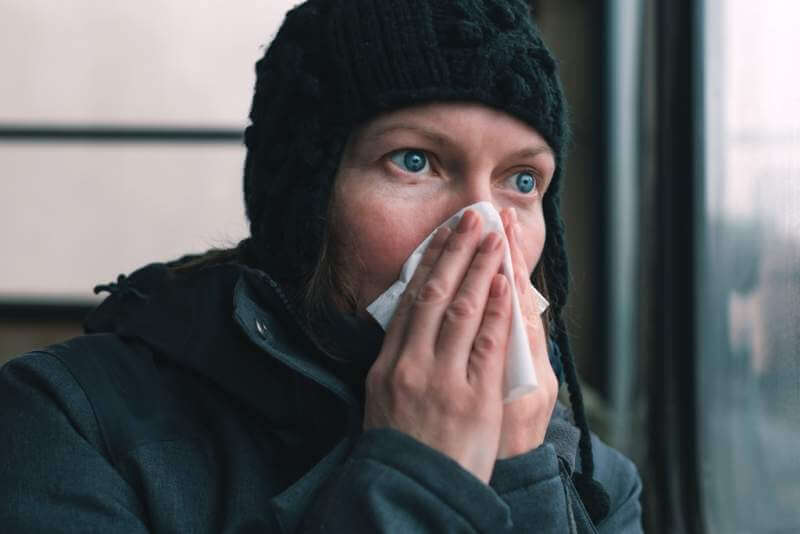Winter storms abound and freezing cold days and nights seem like they are permanently here to stay. Yet in a few months’ time, spring will be here before you know it. And when the weather finally begins to warm up, people begin to spend more time outside as they enjoy the wonderful weather and feelings of renewal this time of year tends to bring about.
With outdoor activities and longer days and shorter nights, you can expect to feel the effects of typical spring illnesses and other health-related concerns. It’s best to be prepared for typical springtime problems because you’ll appreciate good health as you enjoy these gorgeous months before it gets too hot and you begin spending more time indoors in the air-conditioning.
That said, we’ll now take a look at five spring related health issues that could potentially rear their ugly head. If you prepare for the inevitable ahead of time, you’ll be able to deal with these illnesses and symptoms head-on so they don’t cause excessive trouble because you didn’t prepare.
1. Springtime Seasonal Allergies
 First and foremost, seasonal allergies have a tendency to be at their worst during the spring. If you know you suffer from these allergies, you can prepare ahead of time. On the other hand, if you’re only discovering this problem now, you can determine your troubles by undergoing allergy testing in Parker CO or have the test performed by medical professionals in your community.
First and foremost, seasonal allergies have a tendency to be at their worst during the spring. If you know you suffer from these allergies, you can prepare ahead of time. On the other hand, if you’re only discovering this problem now, you can determine your troubles by undergoing allergy testing in Parker CO or have the test performed by medical professionals in your community.
Most important of all, if you already know that you suffer from allergies, your best bet is to keep a close eye on the weather so you can begin taking your medication well in advance. On average, we tell all allergy sufferers to begin taking their medicine two weeks prior to the expected beginning of the springtime weather. This way you’ll have the medication flowing through your system ahead of time and your exposure to pollen and other allergens will not be too devastating to your health and well-being.
Remember, when spring is in the air, the flowers, bushes, and budding trees in your community are also going to release pollen. And these allergies can begin as quickly as February, depending on where you happen to live. So be ready and definitely pay attention to the seasons to prepare to keep your allergies at bay.
2. The Common Cold
 For the most part, people tend to believe that they are only going to catch the common cold during the winter when the weather is fairly frigid. But nothing could be further from the truth. In fact, more people suffer from the common cold during the spring and fall months then they do in the harsh cold of the winter. And this is an actual fact that most doctors can confirm.
For the most part, people tend to believe that they are only going to catch the common cold during the winter when the weather is fairly frigid. But nothing could be further from the truth. In fact, more people suffer from the common cold during the spring and fall months then they do in the harsh cold of the winter. And this is an actual fact that most doctors can confirm.
So, once the spring is in full bloom, it’s time for you to begin taking precautions to avoid the sniffling, sneezing, stuffy head and aching that most colds tend to bring about. For starters, you can take steps to keep yourself well by washing your hands regularly, especially when you come in contact with other people. Even better, you should avoid touching your mouth, nose, and eyes during the spring because you’ll be more susceptible to spreading rhinovirus infections this way – otherwise known as the common cold.
If you do end up catching a cold, you should visit your primary care physician for a checkup. They can prescribe medication and confirm that you are suffering from a cold and nothing worse.
3. Lyme Disease
 As companies work on the latest medical advances for many of today’s most pressing health problems, you can bet your bottom dollar that they are looking for a cure to Lyme disease. But until they find this cure, you have to seriously be careful once the warm weather begins to lure you outside to soak up the sun and enjoy the amazing springtime feel in the air.
As companies work on the latest medical advances for many of today’s most pressing health problems, you can bet your bottom dollar that they are looking for a cure to Lyme disease. But until they find this cure, you have to seriously be careful once the warm weather begins to lure you outside to soak up the sun and enjoy the amazing springtime feel in the air.
Depending on where you live, you can be particularly susceptible to Lyme disease. Deer ticks transmit this disease, so if you live in an area with plenty of deer, you need to pay attention at all times – but you need to do so especially if you’re spending time in the grass, or walking through the woods, or hiking trails, or things of that nature.
During the spring, you should stay clear of tall vegetation because ticks have a tendency to hide within them. Buy tick repellent and remember to use it to keep those ugly buggers from crawling up and down your body.
Better yet, perform tick checks after you come in from the outdoors. And if you do happen to find a tick, take a pair of tweezers and remove it from your body. After that, you should pay attention for a fever or rash as well as other possible symptoms over the next couple weeks.
4. Asthma
 Many people experience asthma flare-ups and asthma attacks during the spring, and if this is a problem for you you’ll undoubtedly be no exception. There are a number of different triggers for asthma attacks including the following: insect repellents, changes in air temperature, fertilizers for your yard, and pollen is also a big one.
Many people experience asthma flare-ups and asthma attacks during the spring, and if this is a problem for you you’ll undoubtedly be no exception. There are a number of different triggers for asthma attacks including the following: insect repellents, changes in air temperature, fertilizers for your yard, and pollen is also a big one.
If asthma symptoms become a problem, call a doctor and schedule an appointment for a checkup. You may need an asthma inhaler or another treatment option.
5. Skin Damage
 We tend to forget that we can suffer from skin damage in the spring due to excessive amounts of sunlight. Yet it’s very possible to experience damage from the sun during this time of year.
We tend to forget that we can suffer from skin damage in the spring due to excessive amounts of sunlight. Yet it’s very possible to experience damage from the sun during this time of year.
So, you should protect yourself as best you can. You can do so by wearing hats and sunglasses, putting on strong sunscreen every day, and since the damage from the sun’s rays happen between 10 AM to 4 PM, remember to reapply your sunscreen every two hours to achieve the best results.
Final Thoughts
As you can see, there are plenty of springtime health issues to worry about soon enough. So keep this information handy because you’ll need a reminder in a couple of months when the weather begins to warm up and you and your loved ones begin spending more and more time outdoors. Taking these extra precautions will help keep you and your family safe and sound.
Author bio:
Airto Zamorano is the CEO and Co-Founder of Numana SEO and Numana Medical. He is an experienced business leader and digital marketer with a track record of success.
